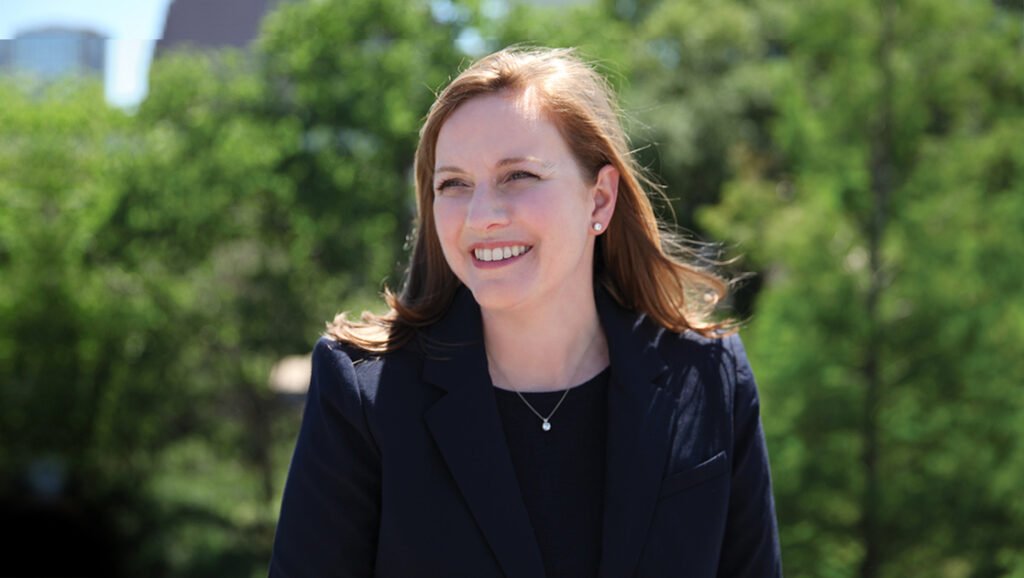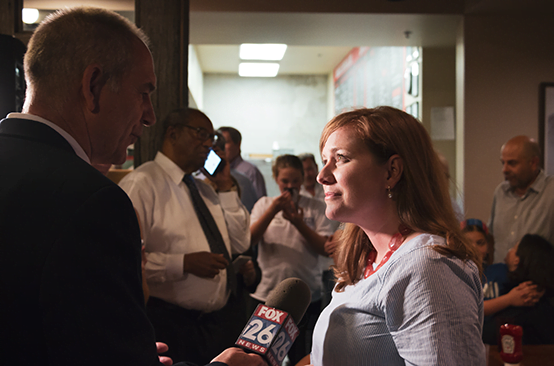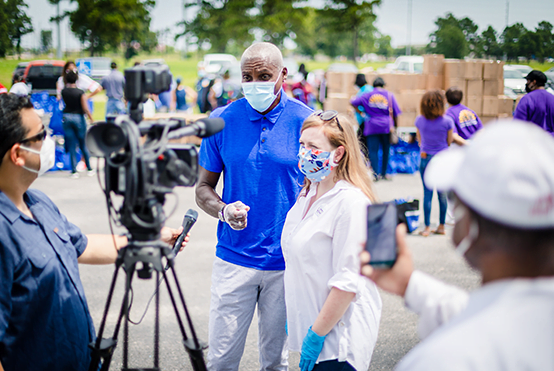A victory by the Democrats would herald the arrival of a formidable multiracial coalition in the country’s largest red state.
BROWNSVILLE, Texas — When Senator Ted Cruz of Texas spoke with President Trump on the phone last week, he congratulated the president on his debate performance, nudged him to keep driving policy-oriented attacks against his opponent, Joseph R. Biden Jr., and relayed one more message.
“We have a fight” in Texas, Mr. Cruz said he told Mr. Trump, warning him that the country’s second-largest electoral prize was in play and that he should take it seriously. In an interview, Mr. Cruz said he expected the president to win here — but that he also saw the same surging liberal energy in his state that had propelled Beto O’Rourke to a closer-than-expected defeat against him two years ago.
“There’s no doubt that it’s a real race,” said the senator, echoing a similar case Mr. O’Rourke made to Mr. Biden earlier this month in their own phone conversation.
But it’s not clear if Mr. Trump or Mr. Biden fully believe it.
They may be on opposite sides of the partisan divide, but Texas Republicans and Democrats alike believe the long-awaited moment has arrived: The state is a true presidential battleground, and either candidate could prevail next week.
Although a Democrat has not carried Texas since 1976, recent public and private polls suggest a highly competitive race, with some surveys showing Mr. Biden up narrowly and others showing Mr. Trump enjoying a small lead.
Yet even as leading figures in both parties urge their respective presidential nominees to take Texas seriously, the campaigns are still reluctant to spend precious remaining time and money there. Neither Mr. Trump nor Mr. Biden is expected to appear in the state before the election, the president has not spent a cent on television commercials, and until this week Mr. Biden had resisted advertising in Texas’ two largest markets, Houston and Dallas-Fort Worth.
Though the state isn’t essential to a Biden victory, Democrats have been more aggressive here. Mr. Biden is dispatching his running mate, Senator Kamala Harris, to Texas on Friday, and Democrats have also planned a multicity bus tour across the state. A pair of Democratic billionaires, Dustin Moskovitz and Michael R. Bloomberg, have separately poured money into the state at the 11th hour.
Senator John Cornyn, a Republican facing his own difficult race against M.J. Hegar, said Wednesday that “the thing that worries me the most” is the Democrats’ late spending, predicting that he would be “outspent by more than 2-to-1.”
The stakes here are, well, Texas-sized.
A Biden win would doom Mr. Trump’s chances for re-election. More significantly, it would herald the arrival of a formidable multiracial Democratic coalition in the country’s largest red state. That would hand the Democrats an electoral upper hand nationwide and all but block Republicans from the White House until they improve their fortunes with college-educated white voters, younger people and minorities.
It’s those demographics that are imperiling Mr. Trump in Texas.
Recent polls, soaring early vote participation in the state’s most populous counties, and more than 50 interviews with Texans in three pivotal regions point to an increasingly competitive race because of a spike in turnout by an electorate that is diverse, loathes the president and makes a mockery of his pistols-and-petroleum stereotype of the state.
The pandemic has slowed the Texas economy, the top selling point for its politicians and the engine for the state’s population growth, with unemployment rising from 6.8 percent in August to 8.3 percent in September. Covid-19 cases are rising; over the past week, there have been more than 6,300 new cases per day on average, an increase of 43 percent from the average two weeks earlier.
With two days left of early voting, turnout in Texas has nearly exceeded the total number of votes cast in the state in the 2016 election. Voters under 30 have showed up in historic numbers, with over 904,000 of them already casting ballots (only 1.1 million such young Texans voted in all of 2016). College-educated white voters and Asian-Americans have turned out in even larger numbers, with both groups casting more ballots than they did four years ago, according to the Democratic group TargetSmart.
While Democrats were infuriated with the decision by Gov. Greg Abbott, a Republican, to limit the number of drop boxes for absentee ballots to one per county, they believe his decision to extend early voting from two to three weeks and to push local elections from the spring to November’s ballot has bolstered their turnout efforts.
Participation has been particularly high in the metropolitan areas — and not just the biggest cities, but also in booming exurban counties, where a diverse new mix of voters is shattering turnout records in the bedroom communities of Dallas, Austin and Houston.
“It is a competitive state, meaning a Democrat can now win statewide,” acknowledged Steve Munisteri, a former chairman of the Texas Republican Party, noting that about 10 million people had moved to the state in the last 20 years. “We’ve had the equivalent of two medium-sized states move in.”
Yet while Texas Republicans are anxious about what they see as a tightening race — and trying to persuade Mr. Trump to confront the threat — Texas Democrats are frustrated by what they see as a lack of investment by the Biden campaign in a state they think would be even more promising had they spent more sooner.
Nowhere has that lack of spending proven more evident than in the heavily Hispanic, and heavily Democratic, Rio Grande Valley, where early vote turnout has lagged the metropolitan areas in part because there’s little partisan competition for congressional or state legislative races.
“This is where the gap is because there are no contested elections down here,” said Gilberto Hinojosa, the chair of the Texas Democratic Party, who has been lobbying Mr. Biden’s campaign all year. “You don’t have the spending that you have in these other areas.”
Mr. Hinojosa said he had received only $15,000 for get-out-the-vote efforts. “The party has had to jump in here,” he said, alluding to Texas Democrats. After initially only planning to have Ms. Harris visit the state’s two largest metropolitan areas, Mr. Biden’s campaign announced Wednesday that she would also visit the Rio Grande Valley.
In border communities like Brownsville and McAllen, the question for Mr. Biden is not whether voters will support a Democrat — they do so reliably — but whether voters in this working-class region hit hard by the coronavirus will turn out at the same levels as the more affluent parts of the state.
Visits to a pair of precincts last week in the Rio Grande Valley revealed a noticeable number of first- or second-time voters, including many students. Many of them were Hispanic and they cast their ballots overwhelmingly for Mr. Biden — or, as they put it, against Mr. Trump.
“It would be hypocritical if, being a woman, being a minority, we vote for a candidate like Trump,” said Denice Salinas, a senior at a local state university, who came to the polls outside McAllen with her sisters and mother, each of whom voted for Mr. Biden.
In Houston’s Harris County, a group of young officials in Texas’ most populous county have gone to great lengths to expand voting, erecting polling places at the site of the old Astrodome, the Houston Rockets arena and the Rice football stadium. Some precincts will open at 7 a.m. on Thursday and stay open all night, not closing until the early vote period ends at 7 p.m. Friday.
“We have done everything we could possibly do to increase voting access,” said Chris Hollins, the youngest and first Black clerk of Harris County, noting that they had tripled the number of early voting precincts from 2016.
1.27 million of the 2.48 million voters in Harris County had already voted by the end of the day Wednesday, nearly as many people as who voted overall four years ago there. If Mr. Biden can significantly expand beyond the 54 percent of the vote Hillary Clinton garnered there in 2016, the gain in raw votes in such a highly populated community could draw him close to Mr. Trump statewide.
The newly elected county executive, Lina Hidalgo, implored Mr. Biden to come to Texas with the lure of even higher turnout.
“We’ve got another million votes to deliver in Harris County,” said Ms. Hidalgo.
Last week, Representative Lizzie Fletcher showed off the county’s main voting hub near the Astrodome and its even larger successor, NRG Stadium, pointing to the rows of drop-off tents set up in its sprawling parking lot and explaining why turnout in the city was boding well for Mr. Biden.
“The divisive nature of the politics that we’re seeing in the Trump era — that’s a hallmark of his style — is not our style here,” said Ms. Fletcher, a Democrat who in 2018 captured a long-held Republican seat representing some of Houston’s toniest neighborhoods, precincts where Biden signs are far more common than Trump signs.
That was clear enough from the diverse array of voters who trickled back to their cars after casting votes in Houston, the vast majority of whom said they were backing Mr. Biden out of animus toward Mr. Trump.
“I’m tired of Trump,” said Irene Duron, who cast her ballot still wearing her scrubs from her job in clinical technology. “And I usually vote Republican.”
Even more striking were a few dozen interviews Saturday at an early voting site in what has been a more conservative community than Houston: Fort Worth’s Tarrant County. Mr. Trump won there by about nine percentage points in 2016.
The voters were overwhelmingly young and people of color, many of them of Asian or Hispanic descent, and nearly all of them said they were supporting Mr. Biden.
“I think most of the young generation is for Biden,” explained Brian Nguyen, a 20-year-old college student, after he voted.
Texas Republicans hope Mr. Biden’s stumble at the final debate, in which he appeared to suggest he wanted to end the oil industry, will snuff out his hopes of scoring an upset in Texas.
But they know Mr. Trump’s caricature of the state is wildly at odds with what could be made clear to the country next week.
“Texas is changing,” said Mr. Cruz. “We’re not home to just oil and gas wildcatters.”




